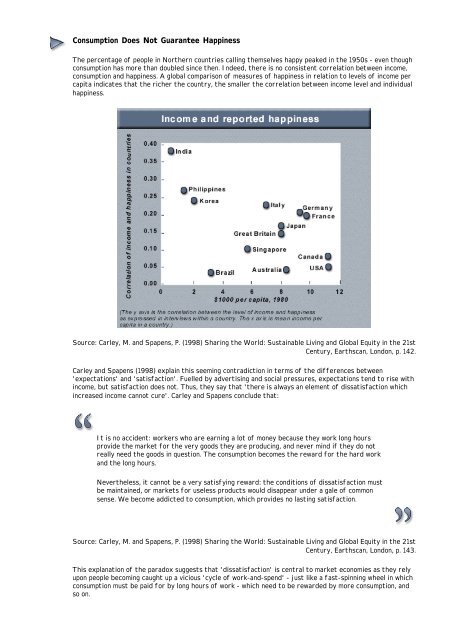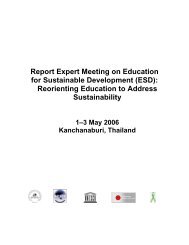Module 9 Consumer education - APCEIU
Module 9 Consumer education - APCEIU
Module 9 Consumer education - APCEIU
You also want an ePaper? Increase the reach of your titles
YUMPU automatically turns print PDFs into web optimized ePapers that Google loves.
Consumption Does Not Guarantee Happiness<br />
The percentage of people in Northern countries calling themselves happy peaked in the 1950s - even though<br />
consumption has more than doubled since then. Indeed, there is no consistent correlation between income,<br />
consumption and happiness. A global comparison of measures of happiness in relation to levels of income per<br />
capita indicates that the richer the country, the smaller the correlation between income level and individual<br />
happiness.<br />
Source: Carley, M. and Spapens, P. (1998) Sharing the World: Sustainable Living and Global Equity in the 21st<br />
Century, Earthscan, London, p. 142.<br />
Carley and Spapens (1998) explain this seeming contradiction in terms of the differences between<br />
'expectations' and 'satisfaction'. Fuelled by advertising and social pressures, expectations tend to rise with<br />
income, but satisfaction does not. Thus, they say that 'there is always an element of dissatisfaction which<br />
increased income cannot cure'. Carley and Spapens conclude that:<br />
It is no accident: workers who are earning a lot of money because they work long hours<br />
provide the market for the very goods they are producing, and never mind if they do not<br />
really need the goods in question. The consumption becomes the reward for the hard work<br />
and the long hours.<br />
Nevertheless, it cannot be a very satisfying reward: the conditions of dissatisfaction must<br />
be maintained, or markets for useless products would disappear under a gale of common<br />
sense. We become addicted to consumption, which provides no lasting satisfaction.<br />
Source: Carley, M. and Spapens, P. (1998) Sharing the World: Sustainable Living and Global Equity in the 21st<br />
Century, Earthscan, London, p. 143.<br />
This explanation of the paradox suggests that 'dissatisfaction' is central to market economies as they rely<br />
upon people becoming caught up a vicious 'cycle of work-and-spend' - just like a fast-spinning wheel in which<br />
consumption must be paid for by long hours of work - which need to be rewarded by more consumption, and<br />
so on.








